Portable carbon monoxide detector with a high-accuracy sensor is easy to carry and operate. 0 to 500 ppm, 0 to 1000 ppm, and 0 to 2000 ppm measuring ranges are optional. Buy a handheld CO gas detector with a gas leakage alarm to prevent carbon monoxide poisoning.
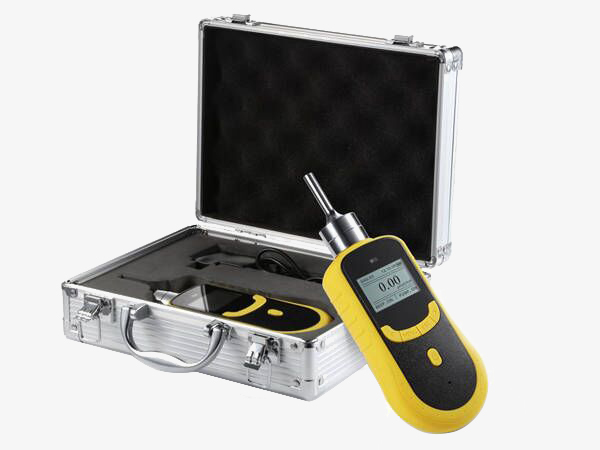
Gas detectors can detect carbon monoxide(CO) quickly
- sisco portable carbon monoxide(CO) gas detector has an LCD dot matrix display to directly read out the gas type, unit, concentration, local time, etc.
- English/Chinese operations are supported.
- Gas concentration unit PPM and mg/m3 can be shifted quickly.
- Built-in micro-sampling pump, 10 grades of suction are available.
Explosion-proof certification.
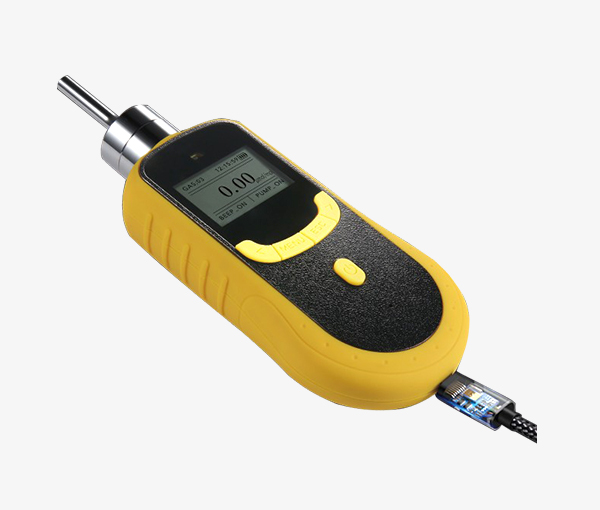
USB interface to transfer data at high speed
- The handheld carbon monoxide detector can download and print the stored data (optional).
- There is no need for personnel to manually record data in real-time, and the data is automatically stored in the instrument.
- Historical data can be viewed on the instrument or downloaded to a computer.
- USB interface, fast and convenient charging.
Details
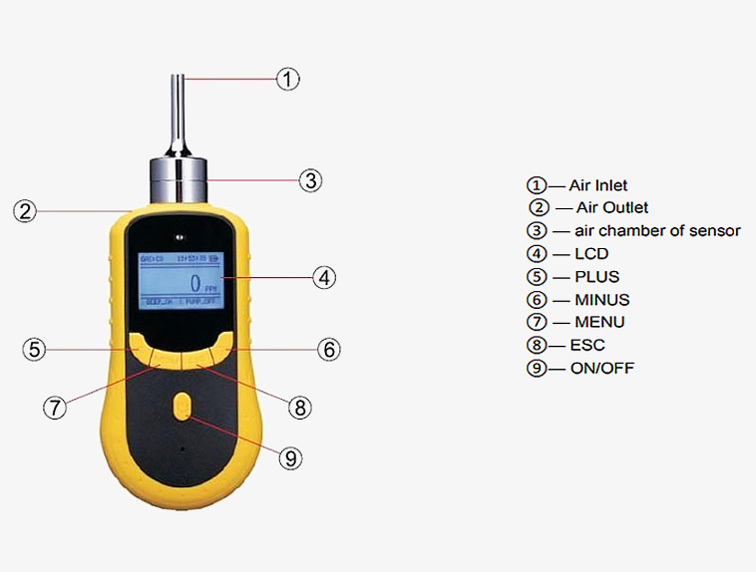
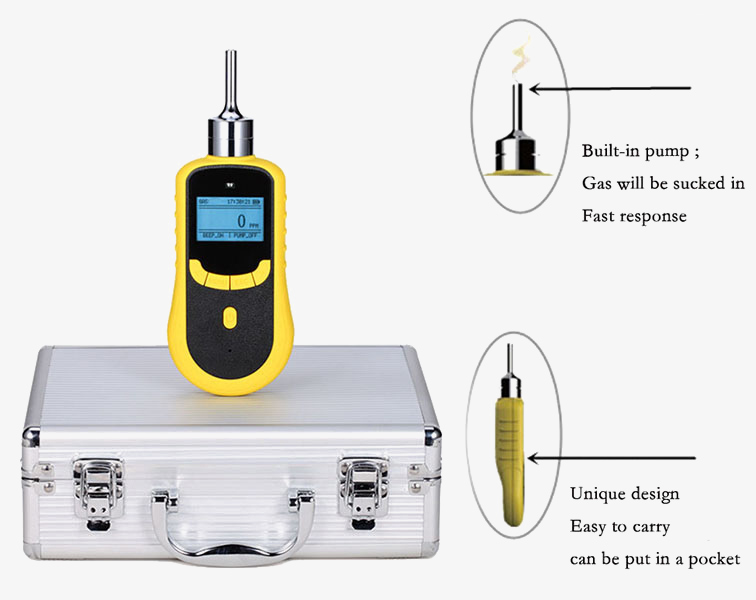
Applications
sisco portable carbon monoxide detector is used to measure CO concentration and alarm in confined spaces in tunnels, sewers, underground shafts, mines, cement plants, thermal power plants, agriculture, oil refinery and other industries to effectively prevent carbon monoxide poisoning.
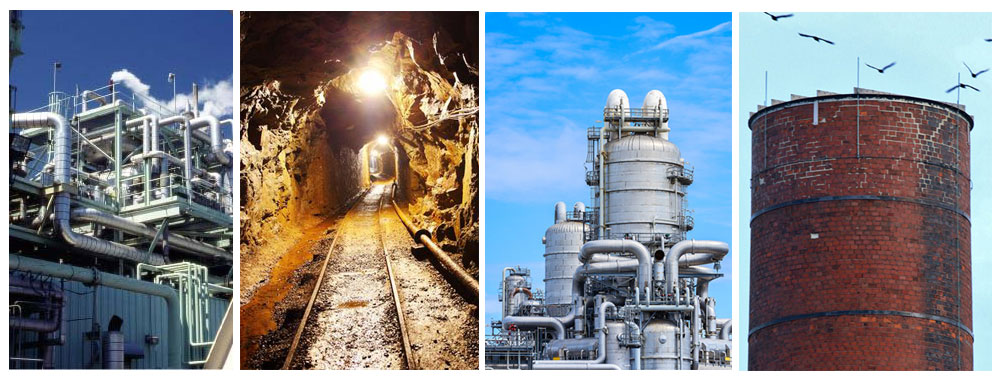
| Model | GD200-CO |
| Sampling Method | Pump type, flow rate can be up to 750ml/min |
| Detection Principle | Electrochemistry |
| Range (Optional)* | 0 to 10ppm, 0 to 20ppm, 0 to 50ppm, 0 to 100ppm, 0 to 500ppm, 0 to 1000ppm, 0 to 2000ppm, 0 to 5000ppm, 0 to 10000ppm |
| Resolution | 0.001ppm (0-10/20/50ppm), 0.01ppm (0-100ppm) or 1ppm (0-500/1000/2000/5000/10000ppm) |
| Accuracy | ≤±3% F.S. |
| Response Time | ≤10s |
| Repeatability | ≤±1% |
| Recovery Time | ≤10s |
| Linearity Error | ≤±1% |
| Zero Shift | ≤±1% (F.S./year) |
| Data Logging (Optional Function) | High speed data transmission by USB, available for data downloading and printing (The built-in IC card has about 2G memory, which can record 100,000 sets of data.) |
| Alarms | Sound, light and vibration |
| Display | LCD dot matrix display |
| Language | Chinese/English |
| Battery | 3.7V rechargeable lithium battery, 3.7 Watt (Charger included: Input AC 100-240V 50/60Hz with optional USA, Europe or UK plug) |
| Operating Time | 100h (Pump off) |
| Communication | Mini USB interface supports standard MODBUS communication protocol |
| Explosion-proof Grade | Ⅱ 2G Ex ia Ⅱ CT4 Ga |
| Case Material | ABS+PC |
| Protection Grade | IP66 |
| Certification | CE, ATEX (Standard: EN IEC 60079-0:2018, EN 60079-1:2014) |
| Operating Temperature | -20℃~50℃ |
| Operating Humidity | 0~95%RH (non-condensing) |
| Operating Pressure | 0.8~1.2bar |
| Dimension | 205*75*32mm |
| Weight | 300g |
| Warranty | 12 months |
| Extension Probe | About 480mm (Total Length), About 300mm (Probe Head) |
| Accessories (Optional) | Calibration kit - gas pressure regulator (calibration gas cylinder NOT included)
|
Note:
* If you need a CO gas detector with other measuring ranges unlisted in the above table, please inform us of your operating environment to help you choose an appropriate one for your application.
* Other portable gas detectors are also provided, you can refer to SISCO Gas Detector Catalog to get the specific gas type and measurement range. If you have any questions, please feel free to contact us.
Packing List:
- 1 × CO Gas Detector
- 1 × Carrying Case
- 1 × AC Adapter
- 1 × User Manual
Gas Detector Catalog & User Manual
 SISCO Gas Detector Catalogue
SISCO Gas Detector Catalogue SISCO GD200 Portable Gas Detector User Manual
SISCO GD200 Portable Gas Detector User Manual SISCO GD300 Online Fixed Gas Detector User Manual
SISCO GD300 Online Fixed Gas Detector User Manual SISCO GD400 Explosion Proof Portable Gas Detector User Manual
SISCO GD400 Explosion Proof Portable Gas Detector User Manual SISCO GD500 Handheld Multi Gas Detector User Manual
SISCO GD500 Handheld Multi Gas Detector User Manual SISCO GD600 Multi Gas Analyzers User Manual
SISCO GD600 Multi Gas Analyzers User Manual SISCO Gas Detector Communication Protocol V1.0
SISCO Gas Detector Communication Protocol V1.0 SISCO Single Stage Pressure Regulator User Manual
SISCO Single Stage Pressure Regulator User Manual SISCO Gas Detector Data Downloading Operation Instruction
SISCO Gas Detector Data Downloading Operation Instruction
Gas Detector Software
Q1: What is a gas detector?
A1: A gas detector is an instrument for gas leakage concentration detection, including a portable gas detector, handheld gas detector, fixed gas detector, online gas detector, etc.
Q2: What does a gas detector detect?
A2: Combustible gases: Natural gas (methane), liquefied gas, coal gas (hydrogen), acetylene, pentane, alkynes, acetone, toluene, alcohols, hydrocarbons, light oil, etc.
Toxic gases: Carbon monoxide, hydrogen sulfide, ammonia, chlorine, oxygen, phosphine, sulfur dioxide, hydrogen chloride, chlorine dioxide and other toxic and harmful gases.
Q3: What is ppm of gas detector?
A3: Parts per million or "ppm" is often used as a fractional measure of concentration. For example, a methane (molecular) concentration of 2% means that 2 out of every 100 air molecules are methane. Likewise, a methane concentration of 2 ppm means that 2 out of every 1 million air molecules are methane.
Tips: What is a carbon monoxide(CO) gas detector?
Obviously, the carbon monoxide(CO) gas detector is the gas detector for detecting carbon monoxide. The portable gas detector is widely used in petroleum, chemical, pharmaceutical, steel, special industrial plants and other areas where combustible gas exists.
Thank you for buying industrial test and measurement equipment on SISCO.com, all products sold by SISCO and the partner cover a 12 months warranty, effective from the date of receiving the products.
What is covered?
SISCO is responsible for providing free spare parts, and free technical support to assist the customer to repair the defective products until the problem is solved.
What is not covered?
- Product purchased from anyone other than a SISCO store or a SISCO authorized reseller.
- Expendable parts.
- Routine cleaning or normal cosmetic and mechanical wear.
- Damage from misuse, abuse or neglect.
- Damage from use of parts other than SISCO approved.
- Damage from use outside the product’s usage or storage parameters.
- Damage from use of parts not sold by SISCO.
- Damage from modification or incorporation into other products.
- Damage from repair or replacement of warranted parts by a service provider other than a SISCO authorized service provider.
- Damage caused by the application environment not meeting the product usage requirements and the failure to perform preventive maintenance.

